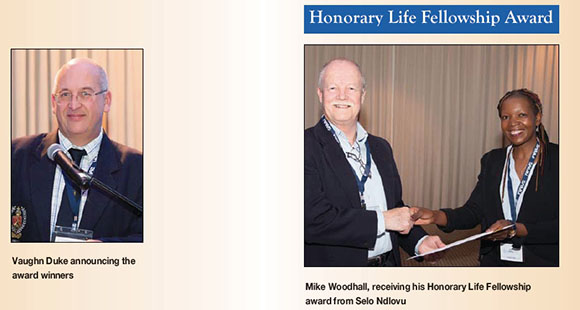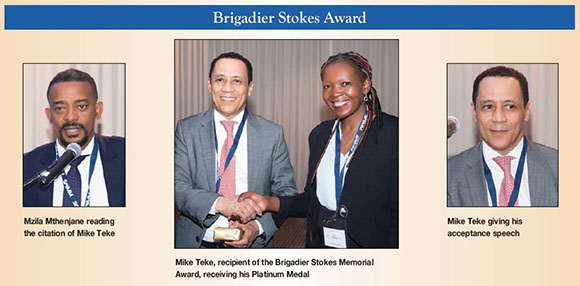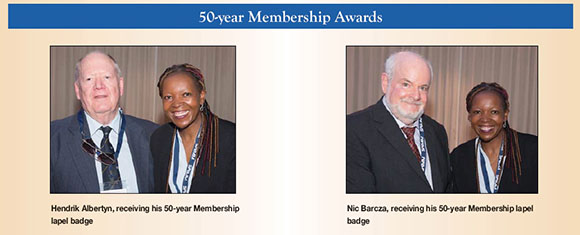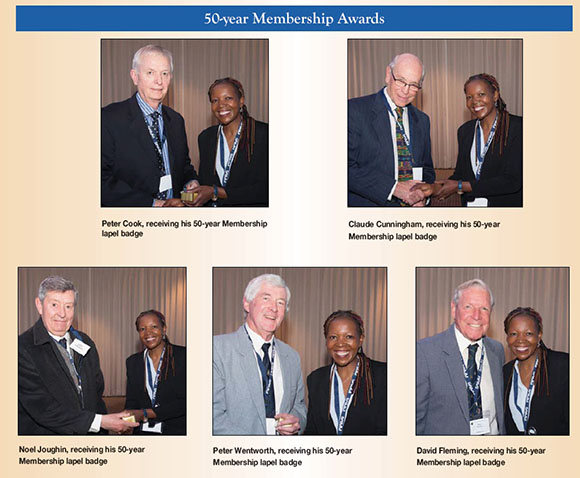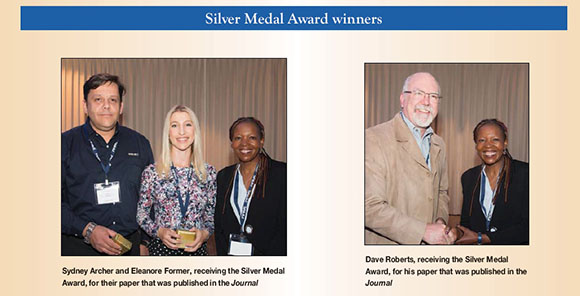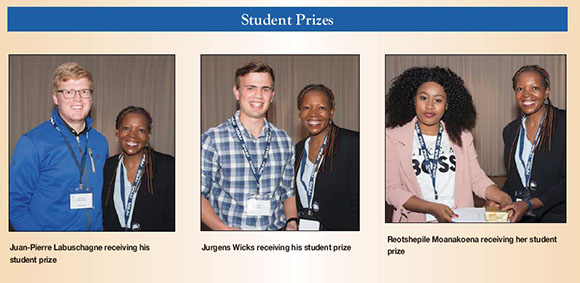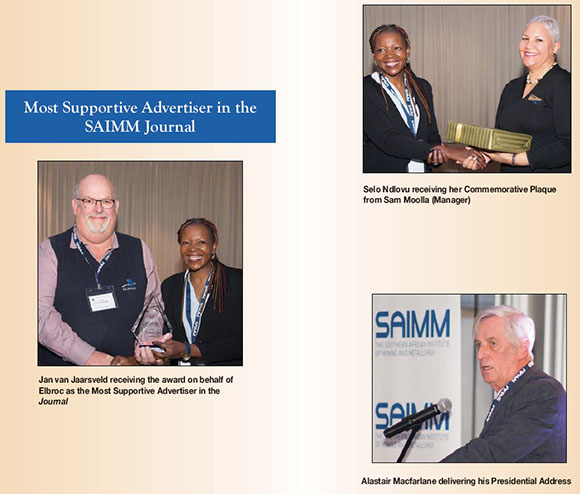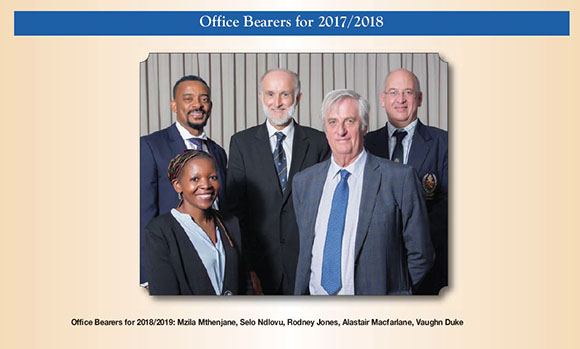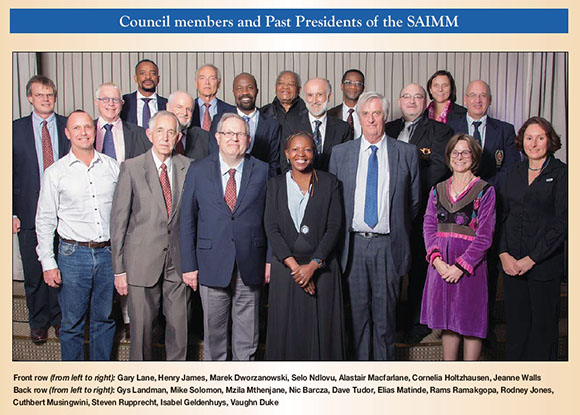Services on Demand
Article
Indicators
Related links
-
 Cited by Google
Cited by Google -
 Similars in Google
Similars in Google
Share
Journal of the Southern African Institute of Mining and Metallurgy
On-line version ISSN 2411-9717
Print version ISSN 2225-6253
J. S. Afr. Inst. Min. Metall. vol.118 n.9 Johannesburg Sep. 2018
http://dx.doi.org/10.17159/2411-9717/2018/v118n9a3
PRESIDENTIAL ADDRESS
Proceedings, 121st Annual General Meeting, 2018
The 121st Annual General Meeting of the Southern African Institute of Mining and Metallurgy was held at the Country Club, Napier Road, Auckland Park, Johannesburg on Thursday 16 August 2018.
Welcome
The President, Selo Ndlovu, extended a special welcome to the guests and representatives of our sister institutes and other associations, and also to recipients of awards, senior members of industry, Honorary Life Fellows, Past Presidents, our members, and other guests, among them the following:
Engineering Council of South Africa
Cyril Gamede, President
Geostatistical Association of South Africa
Christina Dohm, Past Chairperson
Minerals Council South Africa
Roger Baxter, Chief Executive
South African Council on Automation and
Computation
Otis Nyandoro, Past President
South African National Institute of Rock Engineering
Jannie Maritz, President
Women in Mining South Africa
Tendani Lukhaimane, Representative
Past Presidents attending
Nic Barcza
Marek Dworzanowski
Henry James
Rodney Jones
Gys Landman
Cuthbert Musingwini
Joshua Ngoma
Rams Ramokgopa
Gordon Smith
Dick Stacey
Minutes
The minutes of the previous Annual General Meeting, which were published in the September 2017 issue of the Journal and sent to all members, were confirmed.
Obituaries
The President announced the deaths, during the year, of the following members:
Honorary Life Fellows
Oskar Steffen
Members
Kevin McMillan, Miklos Salamon, Dee Bradshaw
Retired Members
John Myles Fowlds
Associates
Rendani Sirwali
In memory of the deceased and in sympathy with the bereaved, all rose and observed a moment of silence.
Honorary Life Fellowship
Vaughn Duke: Honorary Life Fellowship is awarded by the Council to Corporate Members of the Institute who have rendered outstanding service to the Institute over many years. It is my pleasure to announce that the Council has decided to award Honorary Life Fellowship to:
► Michael Woodall, for his outstanding service and support of the SAIMM over many years.
Brigadier Stokes Memorial Award
Selo Ndlovu: The Brigadier Stokes Memorial Award was instituted in 1980 to commemorate the outstanding contribution to the South African mining industry made by Brigadier R.S.G. Stokes, an Honorary Life Fellow and Past President of this Institute. This is the premier award of the Southern African Institute of Mining and Metallurgy and is made to an individual for the very highest achievement in the South African mining and metallurgical industry. It gives me great pleasure to announce that the award for 2018 is to be made to Michael Solomon Teke.
Selo Ndlovu called upon Mzila Mthenjane to read the citation:
Michael Solomon Teke was born in KwaThema, Springs in 1964 and holds BA (Ed) and BEd (University of Limpopo) 1985-1989; BA (Hons) (Rand Afrikaans University, now the University of Johannesburg) 1995-1996; and MBA (Unisa) 1999-2002. He started his career as a school teacher in 1990, and in 1992 joined Unilever. In 2000 he moved to BHP Billiton, where he rose to the position of Vice President of Human Resources at Ingwe Collieries. He was appointed Head of Human Resources at Impala Platinum in 2005.
Mike served as a Director of Zimplats Holdings Ltd. from January 2006 to February 2007. He was a Member of the IPM from 1992 to 1998, completed a Human Resources Management Programme at IPM in 1992, and has completed a Professional Certificate in Management and an Advanced Diploma in Management through Unisa-SBL. He is a Fellow of the SAIMM.
In 2008, Mike left Impala to be one of the founding members Optimum Coal, a 71% black-owned company whose shareholders included Mlungisi Kwini, Tom Borman, Peter Gain, and the late Eliphus Monkoe. Optimum was listed on the JSE in 2010, with Mike as CEO, after acquiring Optimum Collieries, a stake in Koornfontein Mines, and a stake in Richards Bay Coal Terminal (RBCT) from BHP Billiton. Optimum was South Africa's fourth-biggest coal exporter and was intended to form the foundation for a black-owned coal mining and exploration group, but was acquired by Glencore in 2012. Mike resigned as CEO, but stayed on in the role of Non-Executive Chairman until April 2015.
He became Chairman of the Richard's Bay Coal Terminal in 2012 and is currently serving as an Independent NonExecutive Director. Mike is the founder, Executive Chairman, and controlling shareholder of Masimong Group Holdings, a diversified investment company formed in 2013. Masimong focuses on financial services, energy, agriculture, and industry, and is a member of the Serati Resources consortium, which recently acquired Anglo American's Eskom-tied thermal coal mines. Among his other interests is Dedicoal, a service-based mining and beneficiation vehicle that is active in the South African mining sector.
Since his days as an active CEO in the listed equity of the corporate world, Mike has contributed to various associations and educational bodies and has developed and grown his own business interests. He is Vice Chairperson of Council at the University of Johannesburg. He was appointed Vice President of the Chamber of Mines in 2011 and served as President of the Chamber from November 2013 to May 2017. Mxolisi Mgojo, CEO of Exxaro Resources and incoming President, paid tribute to Mike for his exemplary leadership of the Chamber and his invaluable contribution to the mining industry during extremely challenging times. His inspired leadership and firm belief that mining really matters for the growth, transformation, and development of South Africa has been instrumental to the industry's drive to achieve growth and transformation and governance outcomes that are in the national interest.'
Throughout his career, Mike has responded diplomatically to the pressures facing the mining industry. 'I don't like being confrontational, particularly in the public space,' he says. However, he is not averse to speaking his mind when necessary. In 2014, when the mining industry came under pressure from then minerals minister Ngoako Ramatlhodi on disagreements over the achievement of Charter targets, Teke, who was then Vice President of the Chamber of Mines, said: 'There is a commitment and will, from our side, to transform, but it is not a flat easy thing to do as some black partners will sell their stake to make money while other empowerment shares are under water'. In 2015, when President of the Chamber, he defended the organization against the accusation that it had 'no backbone', saying that the Chamber's role was advocacy. 'Successful advocacy depends on finding the delicate balance that puts SA first but creates an environment in which the mining sector can function optimally', he stated. And, in his address at the Chamber's AGM in 2017: 'We have stood resolute in our desire for achieving growth and transformation and governance outcomes that are in the national interest. We must have the courage and fortitude to continue pushing for what is right in our country and to get the South African dream, as encapsulated in the NDP, back on track.'
Parentless from an early age, Mike was raised by his grandmother, who he regards as one of the major influences in his life. 'My grandmother always said that if you want to make a difference you have to wake up and act . early to bed and early to rise makes a man healthy, wealthy and wise. I still live by that credo. I could have easily been a negative human being as I grew up in an ordinary family that did not have enough, and as an orphan I could have taken a back seat in life, but I have always stayed the course and I am always positive and am driven'. He is also inspired by Philip Hechter, Ram Charan, author Jim Collins, and the late Steve Jobs. His personal key to success? 'The ability to master the art of simplifying complexity. This is what life is all about. Hard work has never killed anyone. Don't be afraid to learn. Just work, deliver, and stay focused!'
Vaughn Duke called upon Mike Teke to come forward to collect his award from Selo Ndlovu. The following is an edited version of his acceptance speech:
'The President Professor Sehliselo 'Selo' Ndlovu, Past Presidents, members of the Institute of Mining and Metallurgy, honourable guests, distinguished ladies and gentlemen.
Good afternoon.
Its August, a month designated for Women, but I believe we should dedicate 24/7/365 to women.
In the name of Zero Harm, we must be relentless in our drive to make our mines safe all the time. We presently sit with 55 Fatalities versus 42 this time last year . It is a good thing that at the outset of the long journey called life, we are ignorant of the trials and tribulations that await us on that unpredictable road. I like to say, I was lucky. I was lucky because I was born on the wrong side of the tracks, where I personally learnt that privilege is the enemy of progress. Today, I am honoured to receive the Brigadier Stokes Memorial Award 2018, which was previously received by the greats of the mining industry, great men such as Mr Sipho Nkosi, Mr Patrice Motsepe as well as Harry Oppenheimer and a great many others.
I was born in a place called Masimong or Masimini, in KwaThema, Springs. I believe that it is its harsh winters and the warmth of its people that carved me into the individual that I am. In many ways, I represent their hopes and fears. We hope for a better life for our children, community ,and ourselves. And we always fear that poverty, which is something I know so well, is always lurking around the corner.
First, let me tell you about the harshness of KwaThema. The winters are cold, and the cold pierces through the bones. When I was a younger, every day before sunset, you had to make sure that the wood had been chopped and the coal collected to make a fire in the coal stove. Coal was fuel not only for the household, but for the community. There were people like Mr Mathunjwa who had a coal business. Without people like him there was no eating, no heating, no washing - because you had to put the kettle on the stove in order to get hot water to wash for school, and in the case of adults, in order to go to work. Coal was sold on horse-drawn carts, and you knew that it was coming because invariably the coal-sellers would sit in the cart and shout - Yoyoyo... yoyo... Some would use a bell, sing, shout. do something to let people know that the coal-cart was passing by. When we were kids, cars were very few. So we would run out and hold on to the back of the coal cart, letting your legs hang in the air, just to be on something that is moving on four-wheels. It was dangerous but it was fun.
We always knew that coal was both dirty and dangerous. Coal caused death through carbon monoxide poisoning. There were instances where children woke up at the crack of dawn to light up imbawula, or the brazier and bring it into the room. Needless to say, the ventilation is poor in a single room such as a shack. Mom leaves and tragically, children suffocated and died.
That has always been the dilemma of coal - cheap, dirty, and deadly. Nothing has changed much, even in these the days of environmental awareness. At Seriti alone we employ a number of coal miners, and they are responsible for 5 times that. Their children have to go to school, hopefully under very different circumstances to what I experienced. Shareholders of mining companies are largely pension funds which take care of the savings of retired teachers and nurses and the general public.
The coal dilemma is indicative of the challenges faced by management these days. Management challenges are not between right and wrong, but between right and right, as the Harvard scholar and ethicist Joseph Badaracco argues in his book, Decisive Moments. We cannot look at decision-making from a single perspective. We have to look at the impact it has on the environment in which we live, the employees and communities, the country, the shareholders - who are the pension funds of the people as I said earlier.
Our most pressing role as leaders in the mining sector is to stop the bleeding of jobs. When mines close down, they lead to ghost towns and untold suffering. This cannot be achieved by wishes alone. It requires serious engagement among all players. The underlying principle should be that this is our country, we should take pride in it, but most importantly, we must remember that a nation is in good hands when its old people plant trees whose shade they will never enjoy. We should ask the question, which trees are we planting or are we harvesting even before we sow? Are we making sure that in the future there will be new recipients of this august award or are we experiencing its last days, which would be a great pity?
Armed with the vision of the future that we want to create, the mining industry, together with the government of South Africa, should look seriously at strategies of restoring the local industry's global leadership. For instance, a few years ago cars were some of the major polluters. Today, thanks to filters and major progress in science, cars have clean technologies. The countries that are original equipment manufacturers in the automotive sector, such as Germany, are enjoying strong economies underpinned by robust growth.
Likewise, our country should invest in filter technologies that will make power stations emit well-filtered and cleaner air. We need good, reliable power stations if South Africa is to create jobs for the millions of its youth. As things stand today, you cannot power a smelter with wind turbines or solar power.
First we must start at home. Our trading partners, particularly China and the USA, have what they call the Africa strategy. They are actively investing in the continent while we argue and debate about small stuff. We should be active participants in the development of our continent. Mining built cities such as Johannesburg here in South Africa, and we must have a plan on how mining will build better cities throughout the continent. So that most children can have a better life than my childhood and certainly a better future. At this time, ladies and gentlemen, our country's mining industry is facing critical challenges that require strong leadership with an unselfish commitment to enhancing its performance so that it is able to compete more effectively with other global mining jurisdictions. I am convinced of our ability to compete meaningfully with the United States, China, Canada, Australia, as well as all of the mining sectors that we find elsewhere on our own African continent.
Ladies and gentlemen, I am both honoured and privileged to be here at what is a truly auspicious event and at which I am to be the grateful recipient of an equally auspicious award. And for it I am enormously thankful to my grandmother, Dorothy Teke, who took on the responsibility of raising me with a disciplinary approach concentrated on the value of hard work and integrity. Very little changed when my grandmother passed on and my sister Maria stepped into her responsibly authoritative shoes. It was my additional good fortune to receive support from the broader family and friends. Again, I am deeply indebted to my sister who to all intents and purposes became my mother and has fulfilled that role right up to today. I emphasise, my family is big and virtually all of them supported me. I am eternally grateful.
I thank the Institute and all of its distinguished members for giving me this esteemed award and I intend dedicating it in the first instance to my grandmother, Dorothy Teke, who never wavered in her profound commitment to raising and providing invaluable guidance to an orphaned grandson. It is dedicated as well to my sister Maria and to my wonderful wife, Sandi. All three of these ladies have been infallible pillars of support throughout my life and they occupy a very special place in my heart.
Ladies and gentlemen, I stand here this afternoon as a proud South African who has earned recognition as a longstanding member of the South African mining community. I remain committed to making a positive difference to the industry.
Earlier I spoke about the unpredictability of the journey. There is a saying that if you have to go fast, go alone, but if you want to go far, go with someone. I've been lucky to have met my beloved wife of 26-years, Sandi, who has been my constant companion and invaluable guide and adviser. Sandi knows better than anyone else both the painful times that I have endured, and the good times that I have enjoyed. She is here today to share the honour that has been bestowed upon me and with your indulgence, ladies and gentlemen, I want to thank her for always keeping the home fires burning. Thank you also Sandi for taking care of our two lovely children - our son Boikanyo and our daughter Tshiamo. I woke up one day wanting to take them to school when it dawned on me that I was too late. They had completed matric, were young adults and I had hardly noticed. Why? Mainly because I was consistently busy marvelling at the massive yellow equipment in front of me, the draglines on the horizon and the different stopes and panels at operations with which I was associated.
In conclusion, let me say that I am acutely aware of the distinguished work performed by the Southern African Institute of Mining and Metallurgy and the value that comes out of the Institute's deliberations. I know most of the key people in this organization and I believe that you still have a major role to play in shaping the future of mining in our country.
Thank you for recognizing me.
Presentation of awards, medals, and certificates
Vaughn Duke announced the following awards, medals, and certificates, which were presented by Selo Ndlovu.
50-year Membership Awards
(with effect from 1 July 1967 to 30 June 1968)
►Hendrik George Albertyn
► Nicholas Adrian Barcza
► Alan George Cameron Merson
► Peter John Cook
► Claude Victor Bruce Cunningham
► Noel Cain Joughin
► Robert Arthur Lindsay
► Herman Egbertus Lombard
► Montaque Cholmondeley William Morris
► William Alan Nairn
► Andrew David Ochse
► Mervyn van Ryneveld Steyn
► Hans Helmut Stotko
► Peter Stenhouse Wentworth
We also have a recipient who was unable to collect his badge last year, who requested to receive it at this year's AGM.
► David Robert Fleming
The Danie Krige Memorial Award
The Danie Krige Memorial Award was instituted in 2013 to honour the memory of Professor Danie Krige, who was one of South Africa's most influential mining engineers and a geostatistician of international repute.
The Danie Krige Memorial Award is considered for the best geostatistical paper published in the SAIMM Journal between January and December 2017.
There was no award this year.
Gold and Silver Medals
Papers published in the Journal from March 2017 to February 2018 by members of the Institute were considered for medals.
Gold Medals
Gold medals are awarded for papers that are of a world-class standard, and judged to be publications that will become key references in their mining or metallurgy field in the future. No awards were made.
Silver Medals
Silver medals are awarded for papers that make a major contribution to the professions of mining and metallurgy and to the prestige of the Institute. Silver Medals were awarded to:
E. Former, S. Archer, V. Coetzee, K. Soldenhoff, and J. Quinn for their paper published in the February 2018 issue of the Journal entitled: 'Uranium recovery from high-chloride sulphate leach solutions: A cost trade-off study of using treated water vs saline water as make-up water'.
As non-members, V. Coetzee, K. Soldenhoff, and J. Quinn received certificates of merit.
D. Roberts for his paper published in the July 2017 issue of the Journal entitled: 'Calibration of a numerical model for bore-and-fill mining'.
Presentation of Student Prizes
Vaughn Duke announced the student winners of the SAIMM Prestige Prize and Selo Ndlovu presented the awards to the students adjudged by their departments to be the best final-year students in 2017.
University of the Witwatersrand
Mining Engineering S. Motha
Metallurgical Engineering M. Dlamini
University of Pretoria
Mining Engineering J-P. Labuschagne
Metallurgical Engineering J. Wicks
University ofJohannesburg
Mining Engineering No award
Extractive Metallurgy R. Moanakoena
The following SAIMM student prizes were presented at the Western Cape Branch AGM on 3 September 2018.
University of Cape Town
Best final-year student
Mineral Processing V.L. Dzimbanhete
Mineral Processing D.S. Goho
University ofStellenbosch
Best final-year student
Mineral Processing C. Laker
Cape Peninsula University of Technology
Best final-year student
Mineral Processing R. Mapfumo
The Western Cape Branch also awards two Outotec postgraduate scholarships for students conducting research in the area of sustainable mineral processing, but there was no award this year.
SAIMM 5 Star Incentive Programme
The SAIMM 5 Star Incentive Programme was introduced in 2015 to thank members who contribute to the growing membership of the SAIMM and to provide additional benefits to Fellows and Members of the SAIMM. The following will receive free attendance at the Annual Banquet in 2019.
The Top 5 proposers were:
Darius Muma
Gangatha Dabula
Sihe Nhleko
Markus Erwee
William Joughin.
The Top 5 referees of papers published in the Journal were:
Marek Dworzanowski
Markus Erwee
Matthew Handley
Norman McGeorge
Steven Rupprecht
The author who submitted and published the most papers in the Journal was: John Bunt.
Top advertiser in the Journal
The award for the most supportive advertiser in the Journal was made to Elbroc. Jan van Jaarsveld received the award on their behalf.
Annual Report
Selo Ndlovu presented the Annual Report with highlights of his year as President.
Accounts
The Honorary Treasurer, Vaughn Duke, presented the financial statements, which are reproduced in the Annual Report in this edition of the Journal.
Office bearers and Members of Council for 2018/2019
Selo Ndlovu announced the office bearers for the ensuing year, elected by the retiring Council in accordance with Clauses 3.5, 5.1, and 5.2 of the Constitution:
President Alastair Macfarlane
President Elect Mzila Mthenjane
Senior Vice President Zelmia Botha
Junior Vice President Vaughn Duke
Immediate Past President Selo Ndlovu
Honorary Treasurer Vaughn Duke
In terms of the election of ordinary members of Council (Clause 3.2.7 of the Constitution and By-law B2.1), there were fourteen vacancies and the following members are now declared elected (in alphabetical order):
Isabel Geldenhuys
Cornelia Hotzhausen
William Joughin
Gary Lane
Elias Matinde
Harmony Musivarira
Godknows Njowa
Steven Rupprecht
Navin Singh
Andrew Smith
Michael Solomon
David Tudor
Andrew van Zyl
Jeanne Walls
In terms of By-law F1.7 of the Constitution, the Chairpersons of the branches are as follows:
Botswana Len Dimbungu
DRC Susa Maleba
Johannesburg John Luckmann
Namibia Nikowa Namate
Northern Cape Fabian Nieuwenhuys
Pretoria Roelf Mostert
Western Cape Lawrence Bbosa
Zambia Darius Muma
Zimbabwe Clara Sadomba
Zululand Christo Mienie
The Chairperson of the South African National Council on Tunnelling (SANCOT) is R. Tluczek.
These Chairpersons will be ex-officio members of Council.
In terms of By-law I, which governs the Young Professionals Council, Clause 4.1 states that the affairs of the YPC shall, subject to the control of the Council, be managed by the YPC members constituted as follows:
The office bearers of the YPC are:
Chairperson
Katlego Letsoalo
Vice Chairperson Gangatha Dabula
Immediate Past Chairperson Sihesenkosi Nhleko
The Chairperson and Vice Chairperson will represent the YPC on the SAIMM Council.
Clause 14.4.6 states that the YPC must consist of a minimum of 14 and a maximum of 18 members who are 35 years of age and younger. These members are still to be ratified by Council.
The following Past Presidents have signified their willingness to serve on Council for the ensuing year:
Richard Beck
Roger Dixon
Marek Dworzanowski
Henry James
Rodney Jones
Gys Landman
Cuthbert Musingwini
Rams Ramokgopa
Mike Rogers
Don Ross-Watt
Gordon Smith
Willem van Niekerk
Pat Willis
Selo Ndlovu thanked those Past Presidents who indicated that they cannot serve on Council for the next year for all their time, effort, and dedication in the past.
She also thanked Past Presidents for their continued support. She congratulated all those elected, and thanked those who agreed to serve another term of office.
Declaration of Honorary Vice Presidents of the SAIMM for the 2018/2019 session
Selo Ndlovu: the SAIMM has a long standing arrangement of inviting the President of the Minerals Council of South Africa as well as the Ministers of the Departments of Mineral Resources, Science and Technology and Trade and Industry to serve as Honorary Vice Presidents.
These positions are intended to create closer collaboration between our organizations so that we may better serve the needs of our members and the industry.
These positions will be confirmed for the period 2018/2019.
Election of auditors and honorary legal advisers for 2018/2019
Selo Ndlovu proposed, and it was agreed, that Genesis be appointed as Auditor for the coming year and that Scop Incorporated be appointed as Honorary Legal Advisers.
Induction of President
Selo Ndlovu introduced the new President, Alastair Macfarlane, and then called upon Vaughn Duke to read his curriculum vitae.
Presidential Address
Alastair Macfarlane presented his Presidential Address entitled Towards the future: African mining vision, Mining Phakisa, and the SAIMM, which is reproduced elsewhere in this edition of the Journal.
Vote of thanks
Mzila Mthenjane, gave the vote of thanks.
Closure
The meeting closed at 17:55.
